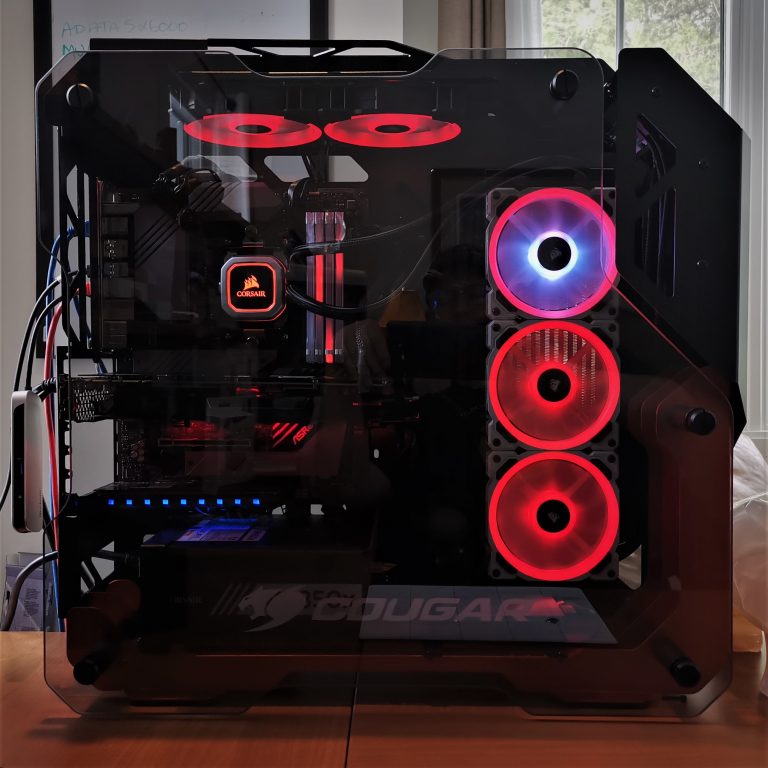TSSDR TEST BENCH AND PROTOCOL
SSD testing at TSSDR differs slightly, depending on whether we are looking at consumer or enterprise storage media. For our Sabrent Rocket NVMe 4.0 M.2 SSD testing today, our goal is to test in a system that has been optimized and will reach top speeds possible.
We are using a fairly new ASRock X570 Creator Test Bench which is AMD based and contains the AMD Ryzen 3700x Gen 4 CPU. Our PC has been overclocked from 3600Mhz to 4300MHz and memory has been set at a XMP profile of 2667MHz,
SYSTEM COMPONENTS
The components of this Test Bench are detailed below. All hardware is linked for purchase and product sales may be reached by a simple click on the individual item. As well, the title is linked back to the individual build article where performance testing can be validated. Tons of credit to this Cougar Blazer Gaming Case paired with Corsair fans and Corsair iCue RGB software which make this our most attractive case to date
TSSDR ASROCK CREATOR GEN 4 X570 TEST BENCH (link)
| PC CHASSIS: | Cougar Blazer Open Frame Gaming Mid-Tower Case |
| MOTHERBOARD: | ASRock X570 Creator PCIe 4.0 |
| CPU: | AMD Ryzen 3700x |
| CPU COOLER: | Corsair Hydro H150i Pro RGB 360mm Liquid Cooling |
| POWER SUPPLY: | Corsair RM850x 80Plus |
| GRAPHICS: | MSI Armor Mk 2 Radeon RX570 OC |
| MEMORY: | Corsair Vengeance LPX DDR4 3600MHz |
| STORAGE: | Intel Optane 905P 1.5TB SSD |
| KEYBOARD: | Corsair K57 Wireless Gaming |
| MOUSE: | Corsair Dark Core RGB SE Wireless BT Gaming |
| OS | Microsoft Windows 10 Pro 64 Bit |
BENCHMARK SOFTWARE
The software in use for today’s analysis is typical of many of our reviews and consists of Crystal Disk Info, ATTO Disk Benchmark, Crystal Disk Mark, AS SSD, Anvil’s Storage Utilities, AJA, TxBench, PCMark 8, and we will be conducting true testing data transfer comparisons. Our selection of software allows each to build on the last and to provide validation to results already obtained.
Crystal Disk Info is a great tool for displaying the characteristics and health of storage devices. It displays everything from temperatures, the number of hours the device has been powered, and even to the extent of informing you of the firmware of the device.
Crystal Disk Info validates that our SSD is running in PCIe 4.0 x4 (four lane), and also that NVMe 1.3 protocol is in use.
ATTO Disk Benchmark is perhaps one of the oldest benchmarks going and is definitely the main staple for manufacturer performance specifications. ATTO uses RAW or compressible data and, for our benchmarks, we use a set length of 256mb and test both the read and write performance of various transfer sizes ranging from 512b to 65mb. Manufacturers prefer this method of testing as it deals with raw (compressible) data rather than random (includes incompressible data) which, although more realistic, results in lower performance results.
Listed specs are 5GB/s read and 4.4GB/s write and our initial results of 5.2GB/s read and 3.98GB/s write are pretty close to the money…one being a bit higher and one a bit lower.
 The SSD Review The Worlds Dedicated SSD Education and Review Resource |
The SSD Review The Worlds Dedicated SSD Education and Review Resource | 


You made jump for the XP941 years ago, as well as an avid ASRock Rack user, now you get me buying the Sabrent.
I bought their external cloning drive caddy for HDD & SSD, with USB 3 ports 7 years ago, 26 bucks. Works like a champ with Acronis too.
Great review, thanks.
If you have been around since the XP941 days, my thanks sincerely. Some great memories throughout the years and the fiasco that resulted in Samsung severely limiting the XP941 availability solely the result of our report brings back some memories. Have a good one and enjoy.
Just a quick question. Is there a timeframe for the release of the Phison E18 controller? It would be good for us consumers to have an option for drives that could test the 7GB read max throughput of the PCI 4 controller. Thanks.
No word as of yet. The difficulty is going to lie in the heat produced by the faster speeds. IMO, passive heatsinks simply won’t suffice at some point. I have to wonder if there will be a line in the sand, at least with M.2 form factors.
Heat shouldn’t be too bad, they are dropping down from the 28nm process to 12nm. That alone should help a lot with managing power consumption. and ultimately heat. Just look at the leap in efficiency AMD got over Intel. Next-gen products just may make Gen4 SSDs a viable upgrade.
Update… Just spoke with Chris at Phison who says they were hoping around Computex which would be next month or so. It would then be a bit later as manufacturers got it up for sale.
Computex has been delayed until September 2020. So I would expect wider availability only in 2021.
The 4TB version is only 5x the price of the 1TB version, and available now.
I too would prefer to max out the PCIe 4.0 and have a newer controller (and NVMe version), fortunately I won’t be buying until next year.
The 4TB version is only a Gen 3×4. It won’t reach this performance. Stay tuned for our report within the next week or so… and then maybe the 8TB after that.